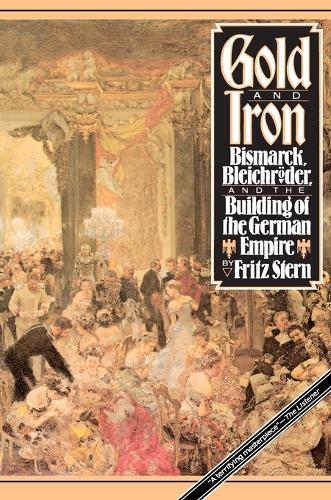
Gold and Iron: Bismark, Bleichroder, and the Building of the German Empire
(Paperback)
Publishing Details
Gold and Iron: Bismark, Bleichroder, and the Building of the German Empire
By (Author) Fritz Stern
Random House USA Inc
Random House USA Inc
27th July 1990
United States
Classifications
General
Non Fiction
943.080922
Physical Properties
Paperback
672
Width 156mm, Height 234mm, Spine 38mm
737g
Description
Winner of the Lionel Trilling Award
Nominated for the National Book Award
A major contribution to our understanding of some of the great themes of modern European historythe relations between Jews and Germans, between economics and politics, between banking and diplomacy. James Joll, The New York Times Book Review
I cannot praise this book too highly. It is a work of original scholarship, both exact and profound. It restores a buried chapter of history and penetrates, with insight and understanding, one of the most disturbing historical problems of modern times. Hugh J. Trevor-Roper, London Sunday Times
[An] extraordinary book, an invaluable contribution to our understanding of Germany in the second half of the nineteenth century. Stanley Hoffman, Washington Post Book World
One of the most important historical works of the past few decades. Golo Mann
In many ways this book resembles the great nineteenth-century novels. The Economist
Author Bio
A recognized authority on modern Europe, Fritz Stern(19382016) was a Seth Low Professor of History and former provost at Columbia University. He held three degrees from Columbia, where he taught for over four decades. He also taught at Cornell, Yale, the Free University of Berlin, and the University of Konstanz in West Germany, and as lie Halvy Professor at the Fondation Nationale des Sciences Politiques in Paris. He received a DLitt from Oxford in 1985 and the Leopold-Lucas Prize from the Evangelical-Theological Faculty of the University of Tbingen in 1984. His works include The Varieties of History: From Voltaire to the Present;Dreams and Delusions: National Socialism in the Drama of the German Past; Gold and Iron: Bismarck, Bleichrder, and the Building of the German Empire, which was nominated for a National Book Award;The Politics of Cultural Despair;andThe Failure of Illiberalism.
